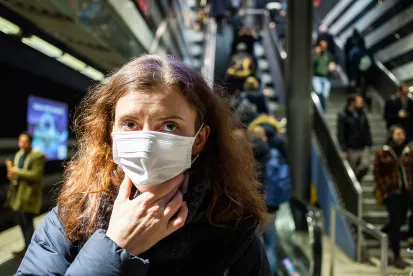Federal Developments
On March 18, 2020, President Trump signed H.R. 6201 known as the “Families First Coronavirus Response Act” (“Families First”), providing American workers with free testing and leave in response to the COVID-19 (“coronavirus”) pandemic. The bill goes into effect on April 2, 2020.
Among other things, under this new law:
• Two (2) workweeks of paid sick leave will be available to employees diagnosed or quarantined for coronavirus.
• Two (2) workweeks of paid sick leave will be available to employees who need to take time off to care for a family member impacted by coronavirus.
• Twelve (12) workweeks of leave will be available for employees needing to take time off to care for a child while their school is closed. The first 10 of those days may consist of unpaid leave, though an employee may elect to substitute any accrued vacation, personal, medical or sick leave for any of those 10 days.
Categories of compensation to employees seeking leave under this new law include the following:
• Employees who are sick or seek a diagnosis can receive their required compensation for regularly scheduled work hours up to $511 daily.
• Employees caring for a family member can receive their required compensation for regularly scheduled work hours receive up to $200 daily
• Employees caring for a child whose school is closed can receive their required compensation for regularly scheduled work hours up to $200 daily
Generally speaking, Families First’s leave benefits apply to workers in companies of various sizes, as well as government workers, employed for at least thirsty (30) days with their current employer. Full-time, part-time, freelancers and self-employed individuals qualify for relief under the bill.
Small businesses made up of 50 or fewer employees, however, may be exempted from paying sick leave if “the imposition of such requirements would jeopardize the viability of the business as a going concern.” Importantly, employers with fewer than 25 employees are not required to guarantee the same or an equivalent position to the employees returning from FMLA leave.
Under Families First employers cannot require employees to use or exhaust their paid time off (e.g., accrued sick time, vacation time, or personal time) before availing themselves of paid leave under the law. The law also prohibits employers from retaliating against employees who exercise their rights and attempt to claim Family First’s benefits. Employers offering paid sick leave will be reimbursed in full, within the annual quarter in which the payments were made, through a payroll tax credit. However, tax credits taken as a result of paid family leave may not exceed the sum total of $10,000 per employee. Family First’s paid leave benefits, which are temporary, will remain in effect through December 31, 2020.
Once enacted, employers are required to conspicuously post notices of the coronavirus sick leave provisions. A government-issued model posting will be promulgated within seven (7) days of the law’s effective date.
New York Developments
Statewide
BREAKING NEWS: As we go to print, Governor Cuomo has just ordered all non-essential workers in New York State to stay home, effective Sunday evening, March 22. The report below covers New York State legal mandates through March 19. We will issue an update based on the governor’s latest order as soon as possible.
New York State COVID-19 Leave Law
The NY COVID-19 Leave Law, signed into law on March 18, 2020 by Governor Cuomo, provides emergency paid sick leave and job protected leave to certain New York-based employees who have been impacted by COVID-19.
The law provides sick leave and other benefits to employees subject to mandatory or precautionary orders of quarantine or isolation issued by government or authorized governmental entities. Leave requirements vary based on an entity’s number of employees as of January 1, 2020 and, in some cases, net income.
Quarantine and isolation leave is required as follows:
• Large Employers and Public Employers – paid sick leave up to a total of 14 days, plus full job protection.
• Medium Sized Employer (11-99 employees) and Certain Small Employers (10 or fewer employees and a net income of over $1 million) - paid sick leave for 5 days and unpaid leave until the termination of any order of quarantine or isolation, the ability to qualify for paid family leave and temporary disability benefits after exhausting paid leave, plus full job protection.
• Small Employers (10 or fewer employees and a net income of $1 million or less) - unpaid leave until the termination of any order of quarantine or isolation, the ability to qualify for paid family leave and temporary disability benefits, plus full job protection.
Quarantine and isolation leave required by the NY COVID-19 Leave Law goes into effect immediately.
Leave available through the NY COVID-19 Leave Law will offset the difference of any benefits offered by the federal government, but in addition to any accrued sick leave provided by an employer’s policies, if any.
The NY COVID-19 Leave Law has several exceptions, which are either express or implied. Employees voluntarily practicing social distancing and voluntary self-quarantine are not covered by this law. Quarantine and isolation leave would not apply to private employers that voluntarily close related to safety and health concerns in connection with COVID-19. Employees may not take paid sick leave if they are deemed asymptomatic or have not yet been diagnosed with a medical condition, and are physically able to work remotely or through other means while under a mandatory quarantine or isolation. Certain employees who are quarantined as a result of non-business travel to level 2 or 3 counties as designated by the CDC are not eligible for leave.
Executive Orders
On March 19, 2020, Governor Cuomo signed an executive order requiring businesses that rely on in-office personnel to reduce their in-office workforces by 75%. Certain essential businesses will be exempt from the order such as shipping, media, warehousing, grocery and food production, pharmacies, healthcare providers, utilities, banks and related financial institutions, and other industries critical to the supply chain. This directive is an increase from the March 18, 2020 executive order requiring a reduction in in-office workforces by 50 percent, and directing non-essential businesses to implement work from home policies. These new rules take effect on Saturday, March 21, 2020. Gov. Cuomo previously issued executive orders requiring all schools, casinos, gyms, theaters retail shopping malls, amusement parks and bowling alleys to close bars and restaurants are required to close for dining, but permitted to remain open for takeout and delivery.
Gov. Cuomo previously issued executive orders requiring all schools, casinos, gyms, theaters retail shopping malls, amusement parks and bowling alleys to close bars and restaurants are required to close for dining, but permitted to remain open for takeout and delivery.
New York City
On March 16, 2020, Mayor de Blasio issued an executive order limiting restaurants, bars and cafes to serving food take-out and delivery that day, and the closure of gyms, nightclubs, movie theaters, small theater houses and concert venues. Mayor de Blasio also required all schools to move to remote learning platforms.
New Jersey Developments
On March 16, 2020, Governor Murphy issued Executive Order No. 104, which implements “aggressive and direct” social distancing actions designed to mitigate the further spread of COVID-19.
Among other directives, the Executive Order limits public gatherings to 50 or fewer people, excluding normal operations at airports, bus and train stations, medical facilities, office environments, factories, industrial or manufacturing work, construction sites, mass transit, or the purchase of groceries or consumer goods. In addition, certain recreational and entertainment facilities must close to the public for as long as the Executive Order remains in effect, including casinos, racetracks, gyms, fitness centers, movie theaters, and nightclubs. Other “non-essential” retail, recreational, and entertainment businesses will be under a mandatory daily curfew from 8:00 p.m. to 5:00 a.m., during which time such businesses may remain open if they limit their occupancy to no more than 50 persons and adhere to social distancing guidelines.
The curfew does not extend to “essential” businesses including grocery/food stores, pharmacies, medical supply stores, gas stations, healthcare facilities and ancillary stores within healthcare facilities. Restaurants, dining establishments, food courts and bars may only offer food delivery or take-out services, with certain restrictions for alcoholic beverage sales. Any violations of the Executive Order may be punished as a disorderly persons offense. The above measures will remain in place until the Executive Order is rescinded or modified by a subsequent executive order. The State legislature has proposed additional measures relating to employment protections and unemployment insurance, which we are closely monitoring.
Takeaways
Though well-intentioned, the latest legislative and executive actions, hurriedly enacted and announced at every level of government, have created a patch quilt of conflicting and confusing rights and obligations for employers seeking to limit the spread of COVID-19 in the workplace, maintain business operations, and protect the health and safety of their employees, customers, clients or patients. Many of these changes are at odds with existing leave, reasonable accommodation, wage and hour laws, and collective bargaining agreements. The most recent legal developments, which go far beyond enhancing workplace hygiene and social distancing measures, have radically changed employment legal requirements and made it far more difficult for employers to evaluate the pros and cons of various employment decisions and actions. During these trying times, employers are strongly advised to consult with legal counsel before implementing reductions in force, shutting down operations, altering leave policies, use of accrued paid leave days, denying such leave, and taking disciplinary action against employees who, due to legitimate fears driven by the pandemic, may be reluctant to report for work or perform certain duties.




 />i
/>i

